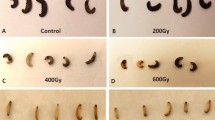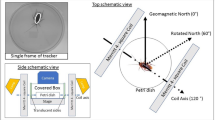Abstract
Radioactive labelling from the Sahara atomic bomb tests (by H. B. D. K.). It has been shown in the laboratory that if the larvæ of Lepidoptera are fed on radioactive foliage for a 24-hr. period, the resulting radioactive imagines can be readily identified. Furthermore, for such an isotope as sulphur-35, the count may actually be higher in the imago than it was in the larva. This is due to the increased surface area of the wings1. More recently, this method has been put to the test in wild populations2. Homometabolous insects, and in particular the Lepidoptera, are in fact ideally suited to this type of labelling.
This is a preview of subscription content, access via your institution
Access options
Subscribe to this journal
Receive 51 print issues and online access
$199.00 per year
only $3.90 per issue
Buy this article
- Purchase on Springer Link
- Instant access to full article PDF
Prices may be subject to local taxes which are calculated during checkout
Similar content being viewed by others
References
Kettlewell, H. B. D., Nature, 170, 584 (1952).
Cook, L. M., and Kettlewell, H. B. D., Nature, 187, 301 (1960).
Author information
Authors and Affiliations
Rights and permissions
About this article
Cite this article
KETTLEWELL, H., HEARD, M. Accidental Radioactive Labelling of a Migratory Moth. Nature 189, 676–677 (1961). https://doi.org/10.1038/189676a0
Issue Date:
DOI: https://doi.org/10.1038/189676a0
Comments
By submitting a comment you agree to abide by our Terms and Community Guidelines. If you find something abusive or that does not comply with our terms or guidelines please flag it as inappropriate.



